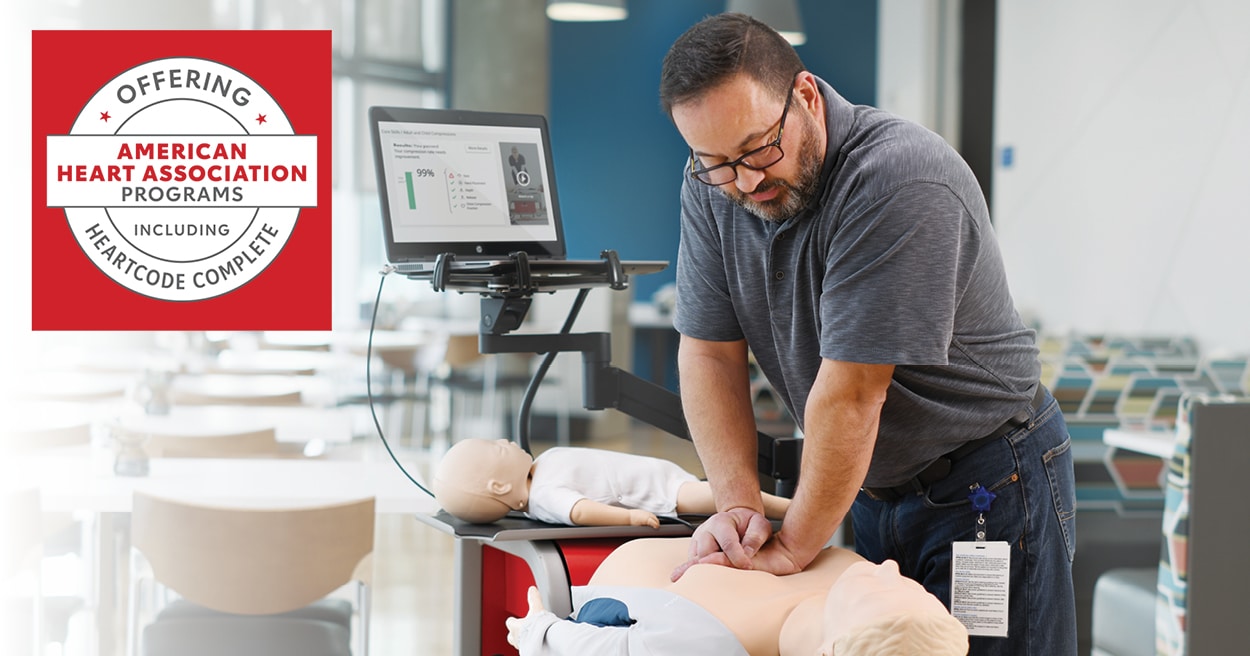American Heart Association© ACLS Certification Classes in San Pablo

American Heart Association© ACLS
Course Name: ACLS Advanced Cardiac Life Support (Initial or Renewal)
Online Course Length: 3-4 hours (At your home.)
Skills Testing: 40 minutes (At one of our over 55 ACLS testing sites.)
Price: $290 (This includes the online ACLS course, skills testing, and card.)
Certification: American Heart Association© ACLS certification card.
When: ACLS classes are offered Monday – Sunday from 7 am to 6 pm
Card Issuance: You will receive the AHA ACLS card on the day of class.
Add ons available: BLS, PALS, First-aid, Opioid, or Bloodborne Pathogens
Lowest Prices in San Pablo Guaranteed: Backed by price matching.
View ACLS Courses in San Pablo & Other Cities Near You
American Heart Association ACLS Classes in San Pablo: Elevating Emergency Cardiovascular Care
In San Pablo, California, the American Heart Association (AHA) offers Advanced Cardiovascular Life Support (ACLS) classes to healthcare providers, equipping them with the skills and knowledge necessary to manage complex cardiovascular emergencies. ACLS certification is essential for healthcare professionals working in critical care settings, emergency departments, and intensive care units, as it enables them to deliver advanced interventions to patients in cardiac arrest or other life-threatening situations. This article explores the significance of ACLS training, the offerings of the American Heart Association in San Pablo, and the impact these classes have on the quality of emergency cardiovascular care in the community.
The Vital Importance of ACLS Training
ACLS training is designed to prepare healthcare providers to respond quickly and effectively to cardiac emergencies, such as cardiac arrest, stroke, and acute coronary syndromes. Participants in ACLS classes learn to recognize and interpret cardiac rhythms, administer medications, perform advanced airway management, and coordinate care as part of a team.
The timely application of ACLS protocols can significantly improve patient outcomes, reducing morbidity and mortality associated with cardiovascular emergencies. ACLS-trained healthcare providers are better equipped to manage critical situations, providing patients with the best possible chance of survival and recovery.
The American Heart Association’s Commitment to Excellence
As a global leader in cardiovascular research, education, and advocacy, the American Heart Association is committed to improving cardiovascular health and reducing the impact of heart disease and stroke. In San Pablo, the AHA collaborates with local healthcare institutions and organizations to offer ACLS classes that meet the highest standards of quality and excellence.
ACLS classes in San Pablo are led by certified AHA instructors who are experts in their field, ensuring that participants receive the most up-to-date and evidence-based training. The AHA’s ACLS curriculum is regularly updated to reflect the latest guidelines and best practices, ensuring that healthcare providers are well-prepared to deliver advanced cardiovascular care.
Comprehensive Offerings of ACLS Classes in San Pablo
The ACLS classes offered by the American Heart Association in San Pablo are designed to meet the needs of healthcare providers at all levels of experience, from novice clinicians to seasoned practitioners seeking recertification. The curriculum covers a wide range of topics, including advanced cardiac life support algorithms, pharmacology, airway management, and post-cardiac arrest care.
Participants in ACLS classes engage in interactive case-based simulations and hands-on practice sessions, allowing them to apply their knowledge and skills in a controlled environment. The AHA’s ACLS classes also emphasize the importance of effective communication and teamwork, essential components of delivering high-quality emergency cardiovascular care.
The Impact on Emergency Cardiovascular Care in the Community
The impact of ACLS training extends beyond individual healthcare providers to benefit the entire community. By equipping healthcare providers in San Pablo with the skills and knowledge needed to deliver advanced cardiovascular care, ACLS classes contribute to improved patient outcomes and enhanced community resilience in the face of cardiac emergencies.
Furthermore, ACLS-trained healthcare providers serve as valuable resources within their organizations, sharing their knowledge and expertise with colleagues and contributing to a culture of excellence and continuous improvement in emergency cardiovascular care. As more healthcare providers in San Pablo undergo ACLS training, the community’s capacity to respond to cardiovascular emergencies grows stronger, resulting in better outcomes for patients and a safer, more prepared community overall.
Conclusion
In San Pablo, California, American Heart Association ACLS classes are playing a crucial role in elevating the standard of emergency cardiovascular care. By providing healthcare providers with the skills and knowledge needed to manage complex cardiac emergencies, these classes are improving patient outcomes and enhancing community safety. Through collaboration, education, and advocacy, the AHA and its partners in San Pablo are working to ensure that everyone has access to high-quality emergency cardiovascular care when they need it most.
FAQs
Who can benefit from ACLS classes in San Pablo?
ACLS classes are primarily designed for healthcare professionals, including physicians, nurses, paramedics, and other allied healthcare providers who are involved in the management of cardiac emergencies.
How long does it take to complete ACLS certification training?
The duration of ACLS certification training varies depending on the specific course provider and format. Typically, ACLS certification courses consist of both didactic instruction and hands-on skills practice and can range from one to two days.
Is ACLS certification recognized nationwide?
Yes, ACLS certification obtained in San Pablo is recognized nationwide and is widely accepted by healthcare organizations, employers, and regulatory bodies across the United States.

